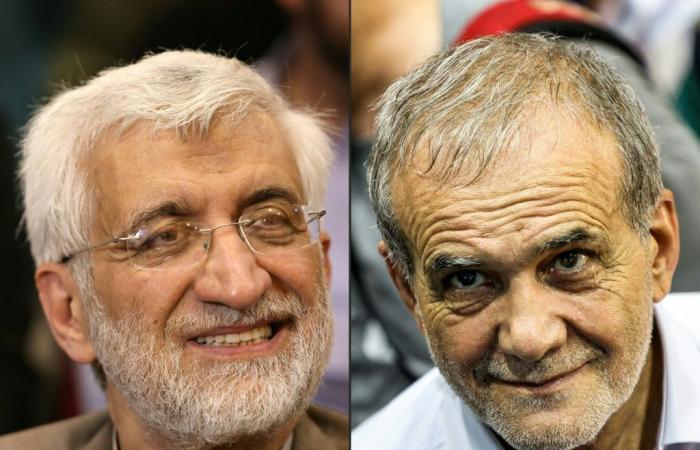afp_tickers
This content was published in
June 29, 2024 – 1:55 PM
The reformist candidate Masud Pezeshkian and the ultra-conservative Said Jalili will compete for the presidency of Iran on July 5, after leading the results of the first round, marked by the lowest participation since the Islamic revolution of 1979.
“None of the candidates obtained an absolute majority” in the first round on Friday, so there will be a runoff between the two most voted for on July 5, Mohsen Eslami, spokesman for the electoral office of the Ministry of the Interior, told reporters on Saturday.
Of the 24.54 million ballots counted, deputy Masud Pezeshkian obtained 10.41 million votes, 42% of the vote, and Said Jalili, who participated in the international negotiations on the Iranian nuclear program, 9.47 million, 38%.
Of the 14 presidential elections held since the Islamic revolution in 1979, only one has so far been decided in a second round, in 2005.
Both candidates were clearly ahead of the conservative president of Parliament, Mohamad Bagher Ghalibaf, with 3.38 million votes, and the fourth candidate, Mostafa Purmohammadi, the only religious person in the running, with 206,397 votes.
On Saturday, Jalili won Ghalibaf’s support for the second round. “I call on all revolutionary forces and my supporters” to try “to elect the candidate of the revolutionary front,” he said.
Two other conservative candidates, who abandoned the race before the first round, called to vote for the ultra-conservative candidate.
– Abstention record –
To win the elections, Pezeshkian will have to rely on a mobilization of abstentionists determined to block Jalili.
But the task does not appear to be easy: of the 61 million voters called to the polls on Friday, only 40% voted.
Some opponents, particularly members of the Iranian diaspora, had called for a boycott of the elections.
The supreme guide, Ayatollah Ali Khamenei, the most important position in the political and religious structure of the Islamic Republic, had urged the population to participate in the vote.
During the 2021 presidential elections, in which no reformist or moderate candidate had been authorized, the abstention rate reached 51%, which at the time was a record.
The elections had to be organized hastily after the death of President Ebrahim Raisi in a helicopter crash on May 19.
The election is attracting international attention because Iran, a Middle Eastern heavyweight, is at the centre of several crises, from the war in Gaza to the question of its nuclear programme.
The Iranian president has limited powers and is responsible for implementing the main political lines outlined by Khamenei at the head of the government.
– Very different candidates –
The second round will pit two candidates with very different profiles and programs against each other.
Pezeshkian, the 69-year-old reform candidate, is an MP from Tabriz, a city in northwestern Iran. His government experience is limited. He served as Health Minister from 2001 to 2005 during the reformist government of President Mohammad Khatami.
The candidate became known for his frankness when expressing himself, and did not hesitate to criticize the power during the protest movement that shook the country after the death of the young Mahsa Amini in September 2022 under police detention, for allegedly failing to comply the strict dress code imposed on women.
With his discreet appearance, this doctor of Azerbaijani origin advocates a rapprochement between Iran and Western countries, with the United States at the head, to lift the sanctions that are severely affecting the economy.
Said Jalili, on the other hand, is in favour of pursuing an uncompromising policy towards the Western powers. The 58-year-old candidate demonstrated this during the six years he participated in the negotiations on Iran’s nuclear programme, between 2007 and 2013.
She also advocates tough policies on issues such as the wearing of the veil by women.
Throughout his career, Jalili rose to key positions thanks to the trust of Ayatollah Khamenei. He is currently one of the two representatives of the supreme national security council, the highest security body in the country.
rkh-jri/feb/sag/es


